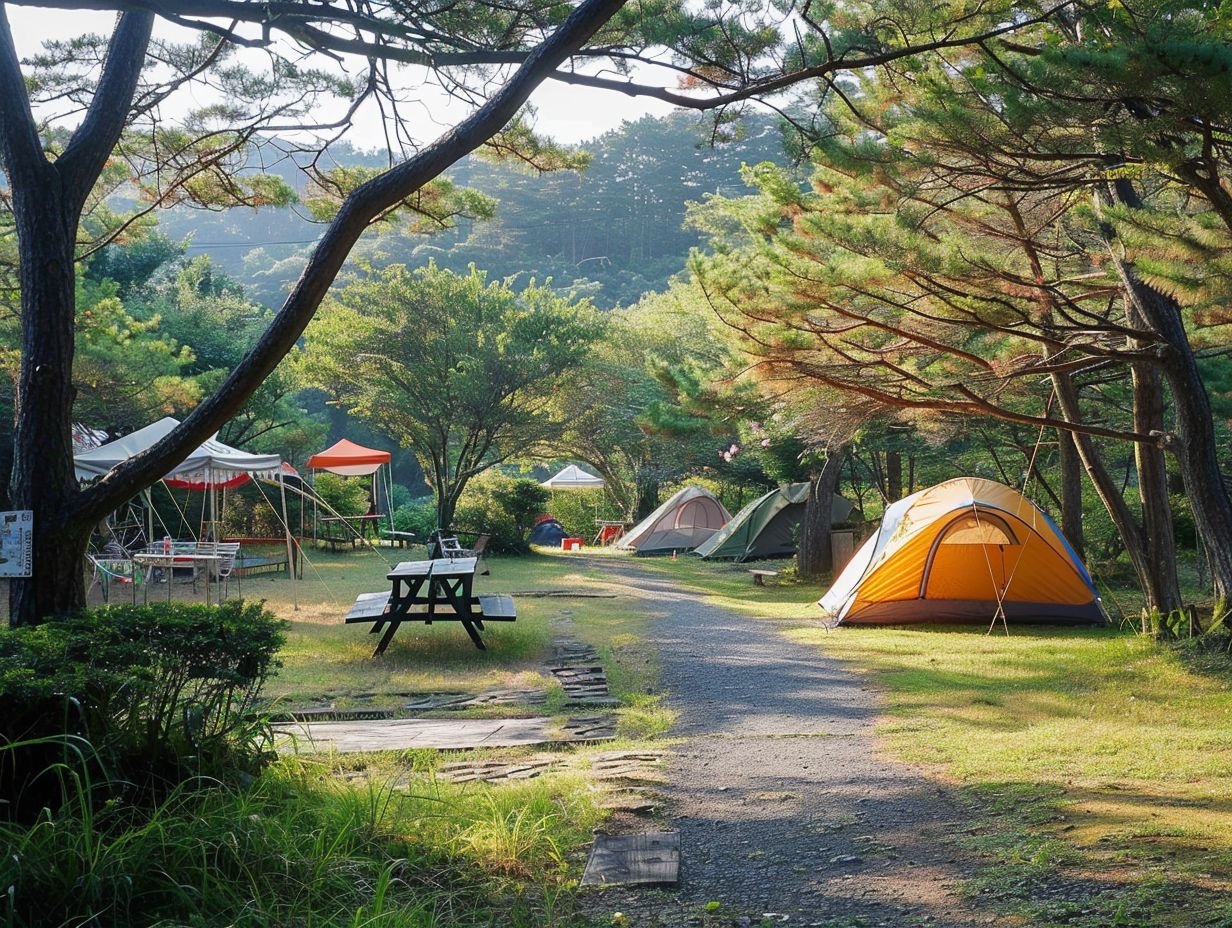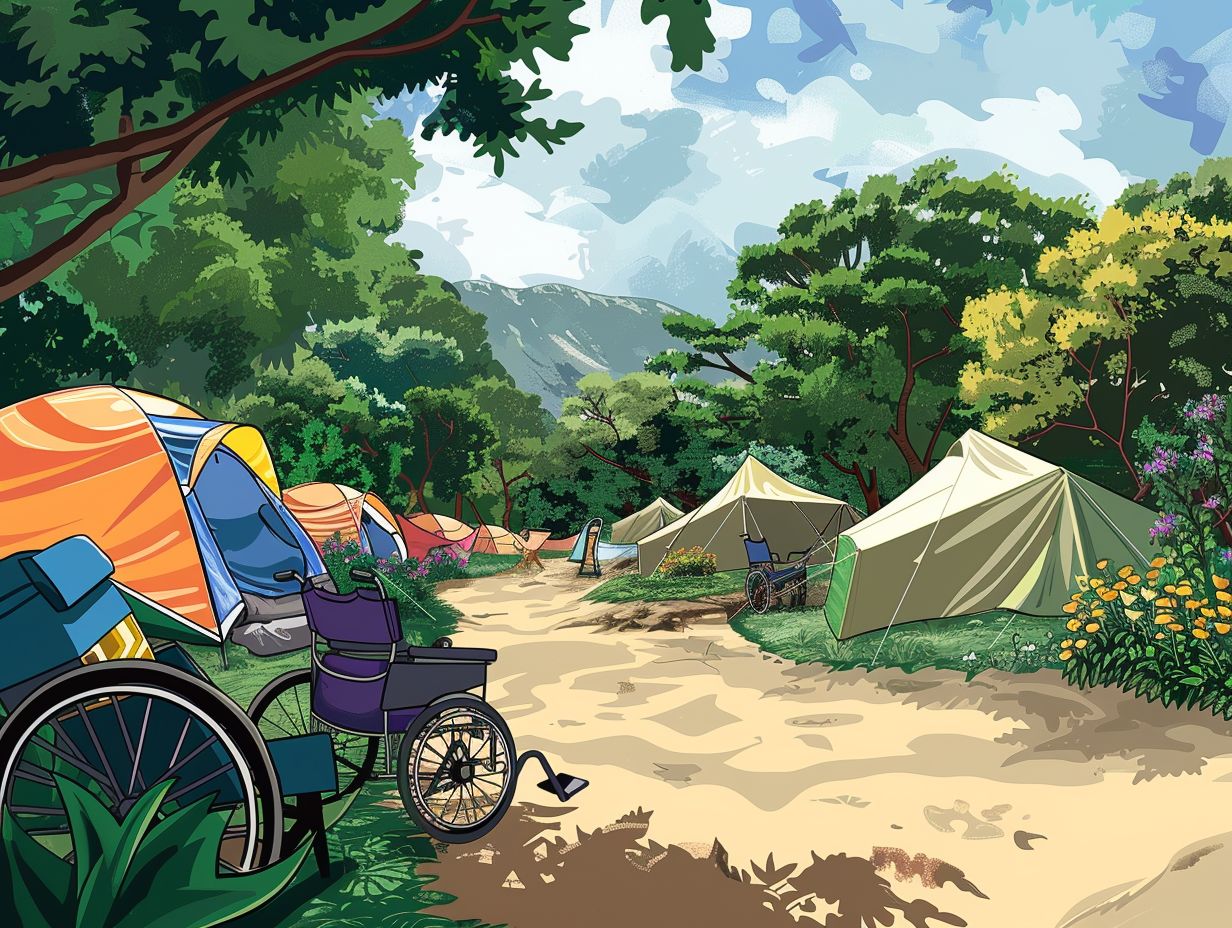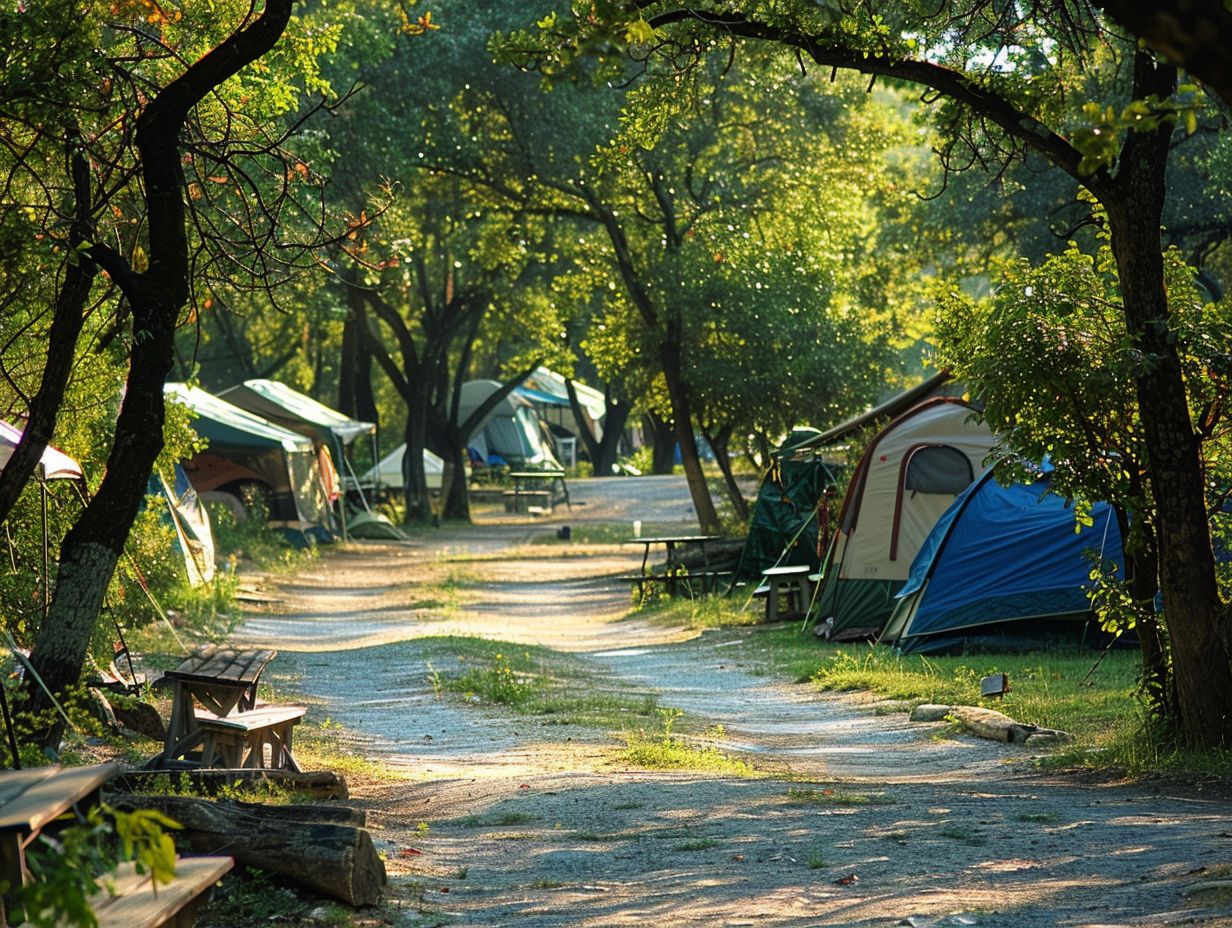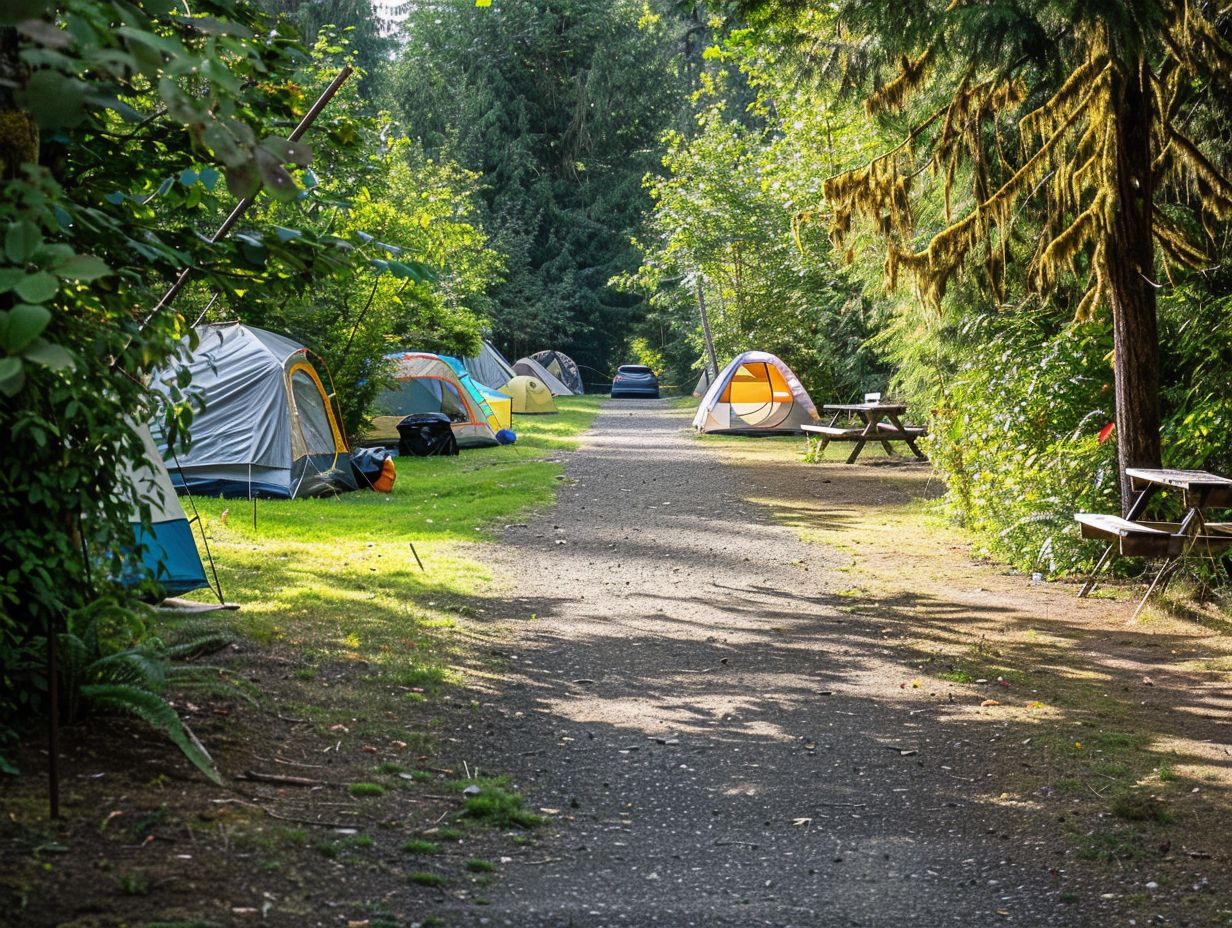Are you considering a camping adventure in the UK but worried about accessibility for individuals with disabilities? This detailed guide offers you all the essential information on accessible camping in the UK. From emphasising the significance of accessible camping to providing advice on enhancing inclusivity during your camping excursion, we address all aspects.
Explore the premier accessible camping locations, understand the typical obstacles encountered by disabled campers, and delve into the future prospects of accessible camping in the UK. Join us on this expedition to promote inclusivity in camping for everyone!
Key Takeaways:

- Accessible camping in the UK is essential for people with disabilities to enjoy the great outdoors and should be available at all campsites.
- When choosing a campsite, consider accessibility features such as wheelchair ramps, designated accessible parking, and accessible restrooms.
- Campsite owners can make their sites more accessible by providing accessible accommodations, hiring trained staff, and continuously seeking feedback from disabled campers.
The Importance of Accessible Camping for People with Disabilities
Accessible camping plays a significant role in enhancing the quality of life for individuals with disabilities by offering them avenues for outdoor recreation, social engagement, and leisure.
These camping sites are tailored to cater to different forms of disabilities, especially mobility impairments, through the inclusion of features such as hoists for transferring individuals from wheelchairs to camping equipment.
Furthermore, expansive access ramps facilitate seamless movement across the site, while slip-resistant facilities guarantee a safe and protected environment for all campers. These inclusive amenities give the power to individuals with disabilities to fully relish the wonders of nature and forge enduring memories in the wilderness.
What to Consider When Choosing an Accessible Camping Site
When selecting an accessible camping site, you should carefully consider several factors to ensure a positive experience. Begin by evaluating the proximity to amenities, access to natural surroundings such as beaches or forests, and the availability of inclusive facilities at the site.
It is crucial to assess the terrain of the camping site. Look for flat surfaces, smooth pathways, and wide clearances to facilitate ease of movement, especially for individuals with mobility challenges. Additionally, check for the presence of accessible parking spaces, ramps, and designated camping areas that are specifically designed to accommodate individuals with disabilities.
The overall environment of the camping site is also important to consider. Opt for locations with a peaceful atmosphere, minimal noise pollution, and safe surroundings to create an enjoyable camping experience for all visitors.
Top Accessible Camping Sites in the UK
Explore some of the finest accessible camping sites in the UK that provide an ideal combination of comfort, nature, and family-friendly amenities. One exceptional option is Woodview Campsite in Bude, which features not only wheelchair-accessible facilities but also breathtaking views of the nearby countryside.
Another excellent choice is Waren Mill Caravan Park near Holy Island, renowned for its accessible pathways designed for visitors with mobility challenges and its serene location surrounded by nature. These campsites present a perfect getaway for families in search of a blend of accessibility and outdoor exploration in the picturesque landscapes of the UK.
Tips for Making Your Camping Trip More Accessible
Enhance the accessibility of your camping trip by implementing practical strategies. Carry portable access ramps, ensure comfortable seating arrangements, and plan ahead for any specific requirements. Investing in collapsible walking sticks or a lightweight wheelchair can assist with mobility around the campsite. Consider bringing a cushion or a special chair for added comfort during relaxation periods.
When communicating your needs to the campsite staff, ensure clarity and specificity regarding any necessary accommodations, such as accessible restroom facilities or proximity to common areas. By following these guidelines, you can guarantee a more pleasant and hassle-free camping experience for all parties involved.
Accessibility Features to Look for in a Campsite

In your search for a campsite, it is important to prioritize locations that offer essential accessibility features. Look for campsites with sturdy handrails, wide pathways, and well-designed tables and counters to ensure a seamless and comfortable stay.
When selecting a campsite, consider sites that provide slip-resistant surfaces for better traction and stability, particularly beneficial for campers with disabilities. Accessible shower and toilet facilities are essential for ensuring campers can use the toilet comfortably and maintain personal hygiene. Additionally, seek out campsites with comfortable seating areas where individuals can relax and socialise without experiencing strain. These features play a key role in fostering an inclusive and welcoming camping environment for all individuals.
How to Book an Accessible Campsite in the UK
Securing an accessible campsite in the UK can be facilitated by considering factors such as your comfort preferences, the availability of motorhome-friendly pitches, and any specific accessibility requirements you may have during the booking process.
Once you have identified your preferred campsite, visit their official website or a reputable booking platform to begin the reservation process. Look for options that enable you to specify your accessibility needs, such as wheelchair-accessible pathways, flat terrain, or accessible restroom facilities.
While making the reservation, do not hesitate to request specific accommodations like lowered counters, ramps, or designated parking spots to guarantee a smooth camping experience. Contact the campsite management or customer service team to inquire about the availability of mobility aids like shower chairs, grab bars, or beach wheelchairs on-site, should you require them during your stay.
Common Challenges Faced by Disabled Campers and How to Overcome Them
When disabled campers embark on outdoor adventures, they may encounter a range of challenges that require careful consideration. By engaging in thorough planning, utilising appropriate equipment like crutches or mobility aids, and prioritising comfort, these obstacles can be effectively managed.
One significant challenge faced by disabled campers is navigating uneven terrain, which can prove difficult and potentially hazardous. To mitigate this issue, the use of assistive tools such as off-road wheelchairs or sturdy walking sticks can offer stability and assistance on rugged pathways.
Another obstacle that disabled campers may confront is limited accessibility to essential amenities like toilets or cooking facilities. A proactive approach involves selecting campsites equipped with ADA-compliant facilities or collaborating with campground hosts to arrange necessary modifications in advance. By addressing these challenges proactively, disabled campers can ensure a safer and more enjoyable outdoor experience.
The Future of Accessible Camping in the UK
The future of accessible camping in the UK appears promising, with a growing emphasis on providing country getaways and holiday experiences that cater to diverse needs, ensuring inclusivity for all campers.
This shift towards inclusivity is noticeable in the increase of specialised facilities designed to accommodate disabled travellers, offering amenities and services tailored to their specific requirements.
Innovative technologies are being integrated into campsites to enhance accessibility, such as mobile apps that provide real-time information on accessible trails and facilities.
Additionally, the expansion of inclusive camping options, including group campsites and accessible cabins, is creating new opportunities for individuals of all abilities to enjoy the great outdoors together.
What Are the Legal Requirements for Accessible Camping Sites in the UK?
Understanding the legal requirements for accessible camping sites in the UK is crucial for ensuring compliance with regulations that mandate equal access and facilities for individuals with disabilities.
UK accessibility laws ensure that camping sites meet specific standards to cater to the diverse needs of individuals with disabilities.
These regulations encompass ensuring wheelchair-accessible paths, adapted toilet facilities, and designated parking spaces. Safety measures are also emphasised, such as clear emergency evacuation procedures and accessible fire extinguishers.
Plus physical accessibility, camping sites are required to provide inclusive accommodation options like wheelchair-accessible cabins or designated tent spaces. By adhering to these standards, camping sites can create welcoming and safe environments for all visitors.
What Are the Benefits of Accessible Camping for People with Disabilities?

Accessible camping offers you a multitude of benefits if you have a disability. It can lead to improved mental well-being, enhanced social connections, and the chance to take part in outdoor activities that promote physical health.
The sense of freedom and independence you can experience while camping in accessible environments is truly transformative. Being able to navigate the campgrounds and participate in various recreational activities can help boost your confidence in your abilities and lead to increased self-esteem.
Accessible camping creates an inclusive and welcoming atmosphere where everyone feels accepted and valued. This supportive community encourages individuals to step out of their comfort zones, try new experiences, and build lasting friendships with fellow campers.
How Can Campsite Owners Make Their Sites More Accessible?
Campsite owners can enhance accessibility for visitors with diverse mobility needs by implementing measures such as installing wide access ramps, adding sturdy handrails, and ensuring slip-resistant surfaces in key areas.
Plus physical infrastructure, investing in staff training on disability awareness is crucial. Educating employees on how to assist individuals with various disabilities and understanding their specific needs can significantly improve the overall experience for all visitors.
Actively seeking feedback from disabled guests about their experiences can provide valuable insights into areas that may require further improvement. By fostering a more inclusive environment and continuously striving to enhance accessibility, campsite owners can create a welcoming and enjoyable experience for all patrons.
What Are the Different Types of Accessible Camping Accommodations Available?
Accessible camping facilities are available in various forms, providing a range of choices for individuals with disabilities. Holiday cottages are equipped with accessibility features, while hill lodges are designed to offer comfort and convenience for disabled guests.
For those seeking a more mobile experience, motorhome-friendly sites are an excellent option. These sites provide convenient choices for travellers with specific mobility requirements. They usually include accessible parking spaces, wheelchair ramps, and adapted shower facilities to meet the needs of campers with disabilities.
Choosing a motorhome-friendly site enables guests to travel at their own pace while still having access to essential facilities. This variety of camping options ensures that individuals of all abilities can fully enjoy the outdoor experience.
How Can Families with Disabled Members Plan a Successful Camping Trip?
Planning a successful camping trip for families with disabled members involves considerations such as selecting suitable seating arrangements, packing necessary medical supplies, and ensuring access to wheelchair-friendly activities and amenities. Communicating effectively is key to organising a smooth camping experience. Before the trip, discuss with each member to understand their individual needs and preferences.
Establish a communication plan that includes clear signals or cues for emergencies or assistance. It’s crucial to research the campsite’s accessibility features and emergency protocols. Prepare a detailed list of essential contact numbers, medical information, and any specific requirements to ensure everyone’s safety.
By fostering open communication and staying prepared, you can create an inclusive and enjoyable camping adventure for every family member.
What Are Some Resources Available for Accessible Camping in the UK?
When seeking accessible camping options in the UK, you can benefit from various resources available to assist you. Online guides, organisations specialising in disability-friendly travel, and directories of accessible campsites across the country are all valuable sources of information.
These resources are designed to cater to the diverse needs of disabled travellers, providing detailed information on accessible facilities. You can find information on wheelchair-friendly accommodation, accessible paths, and adapted amenities through these resources.
Travel agencies such as Accessible Travel Online and Enable Holidays offer tailored services for individuals with disabilities, ensuring a smooth camping experience.
Community networks like DisabledGo and Accessible Countryside for Everyone offer valuable insights, reviews, and first-hand experiences from fellow travellers. By utilising these resources, you can make informed decisions when booking your accessible camping trips.
Frequently Asked Questions

What is an accessible camping site?
An accessible camping site is a campsite that is designed and equipped to cater to the needs of individuals with disabilities or mobility restrictions. This includes facilities such as wheelchair access, accessible toilets, and accessible camping pitches.
How can I find accessible camping sites in the UK?
You can find accessible camping sites in the UK by searching for campgrounds that have been awarded the National Accessibility Scheme (NAS) or by using online resources such as Accessible Countryside for Everyone (ACE) and Disabled Holiday Directory (DHD).
What are some important features to look for in an accessible camping site?
Some important features to look for in an accessible camping site include wheelchair-friendly paths, accessible toilets and showers, level pitches, and nearby accessible activities and amenities.
Are there any camping sites that are specifically designed for individuals with visual impairments?
Yes, there are camping sites in the UK that have been designed specifically for individuals with visual impairments. These sites often have tactile markers, audio description, and other features to assist individuals with navigating the site and participating in activities.
Can I bring my service animal to an accessible camping site?
Yes, most accessible camping sites in the UK allow service animals. However, it is important to check with the specific site beforehand to ensure that they have appropriate facilities for your service animal.
Are there any discounts or special rates for accessible camping sites?
Some camping sites in the UK offer discounted rates for individuals with disabilities or mobility restrictions. It is best to contact the site directly to inquire about any available discounts or special rates.



